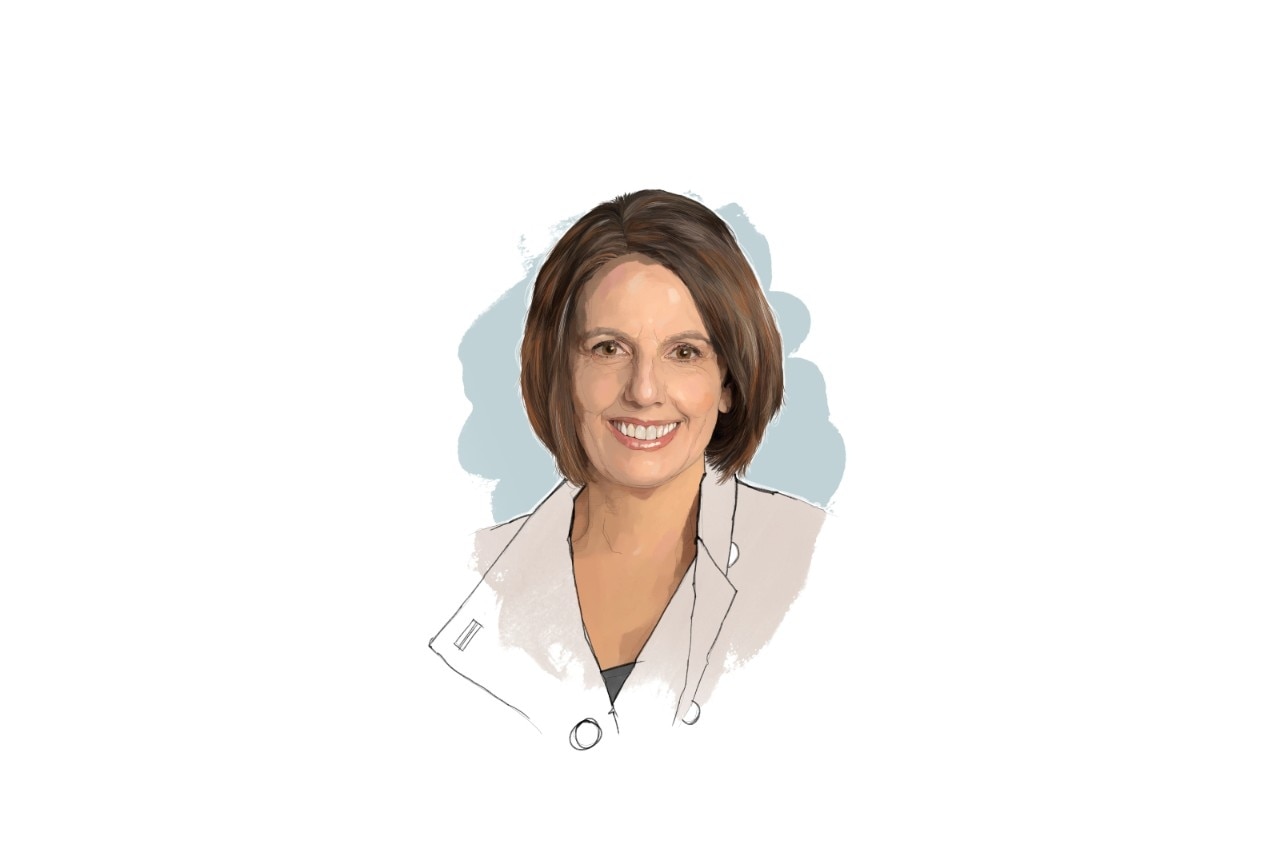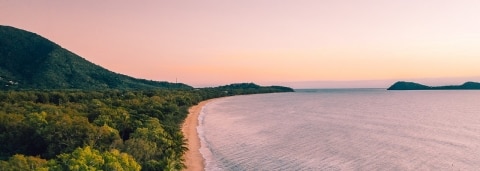Anna-Maria Arabia Says the Best Decisions Have Evidence on Their Side

The head of the Australian Academy of Science says the best decisions have evidence on their side.
Current role: Chief executive, Australian Academy of Science
Tenure: Seven years, nine months
Previous roles: Director of policy/principal advisor to the then Federal Leader of the Opposition, Bill Shorten; general manager – strategy and partnerships, Questacon; CEO, Science & Technology Australia
How do you define good leadership?
Surrounding yourself with people who have skills you don’t and working with them to lift the whole organisation. One of the best decisions I ever made was appointing a really strong second in charge. The complementary skill set there is just dynamite. You achieve so much more collectively.
What’s the one thing you want to achieve?
To improve systems architecture, structures and policies so that evidence can routinely inform decisions, wherever they are made: in our parliaments, courtrooms, classrooms, boardrooms and in the public square.
And how do you feel like you are going, nearly eight years in?
Some done; more to do. We had a moment during the pandemic when we were able to demonstrate what a powerful resource we are to our nation. When we create systems and structures to support decision-making through evidence, we strengthen our decisions and they have better longer-term outcomes.
Public trust in science skyrocketed during COVID. Has it stayed at that level?
There’s still great trust in science and scientists but I don’t want to underestimate the threat that is mis- and dis-information. We don’t operate at the scale to be able to counter that yet. As a community, we always need to show that what we do is considered and done with an ethical mindset. We don’t make advances and discoveries in science “just because” and without any consideration to their impact or technological application. A good example is that we don’t clone humans. Potentially, we have the technology but there are international frameworks that prevent that sort of discovery or application.
In 2011, you led a campaign called Respect the Science because key climate change experts were receiving death threats. Why is science so divisive?
In an environment where there’s growing mis- and dis-information you can have polarisation of issues and the creation of echo chambers. Science can be the proxy target of that polarisation and angst. Political polarisation doesn’t help either. As a nation, we don’t do well at engaging in complexity or in difficult and challenging debates. Decisions are informed by many things – we are not naive enough to think, “Oh, look, science has given us this data and therefore the solution is this.” There’s politics, there’s public opinion, there’s economics, there are all sorts of other factors that influence decision-making. But what we don’t accept is that evidence is not one of those. We do need to harness that.
Does AI scare or excite you?
Both. I think we have a long way to go in terms of putting the appropriate boundaries around AI so that we can harness its benefits and reduce the harm that it has the potential to do. New technologies have always posed threats or what has felt like a very scary environment to us but mostly in the long term they have brought about enormous social advantage and uplift. I don’t think AI is any different; it feels scary because it’s new.
The Academy played a key role in overturning Kathleen Folbigg’s conviction over the deaths of her four children. You have questions over the scientific evidence of Robert Farquharson’s case [in which he was convicted of murdering his three sons]. What needs to change in our judicial system?
The systems that are set up are designed to deliver justice – and mostly they get it right. It’s become particularly hyper adversarial – and I understand an adversarial system is what is needed – but like other systems, it’s being challenged by complexity. Some of that complexity is borne from scientific discovery and technological advancement… Our judges and jurors do their level best but we need to find ways to ensure that science is well understood, communicated and heard in our justice system, and I think the systems we have in place are not serving that need as well as they could.
You’ve suggested some scientists testifying in court may not be subject-matter experts so it’s like asking a plumber about dentistry. That’s such a tricky problem to solve, isn’t it?
We need to work hard at getting the right experts there. Experts are not chosen independently – they are chosen by prosecution and defence. So there are some barriers within the system that could be improved to improve the delivery of justice and to have evidence better understood and heard.
Agitating for change is a key part of your role. Back in the ’80s, then Science Minister Barry Jones famously described scientists as “the wimpiest collection of lobbyists you can imagine”. How would you describe your influencing skills?
I’d like to think they’re effective. I’ve had the privilege of sitting on both sides of the table and that gives me some insights into what can work under particular circumstances and what doesn’t work. I’ve made loads of mistakes but I think I have some techniques under my belt. At the core, it’s about relationships and trust and always doing things in what I call the Academy way – going in with evidence and showing how the system can be improved.
You’ve been calling for the government to overhaul our research and development system and a strategic review has now been announced. What’s wrong with the current system and how could it negatively impact Australia?
We’re at the lowest point of R&D investment as a percentage of GDP [1.68 per cent] in our history. This comes at a time when every major issue we’re dealing with in our society has a solution that has an underpinning in science and technology. The OECD average is closer to three per cent of GDP, which would give us an opportunity to not just compete but to be part of the solutions that we need in this country. The system as a whole has not been reviewed in decades or in any strategic fashion. This includes not just government spending but what incentives exist to stimulate private sector investment or philanthropic contributions, which are relatively low in this country. There will be a significant transfer in inter-generational wealth and that might be an opportunity to boost R&D.
Would you describe yourself as an optimistic leader?
Yes, overly optimistic. I see positives where others see none.
Has that served you well?
It has, I think. Things are possible in my world. The path that you take may not be the path you envisaged but there’s a lot to be optimistic about. And we can do it. We’ve done it before.
In some areas of science Australia is world-leading. Where are we falling behind?
It’s often said that we’re very strong on research and discovery but not good at translating that, which is broadly correct. There have been numerous programs to try and stimulate what we often refer to as academia and industry collaboration but we don’t have huge venture capital investment into Australia to help that early startup phase – which is higher risk – so there does need to be more coordinated and strategic effort. Our population is small but our discovery research effort is oversized in comparison – we risk overlooking that and not investing enough in discovery research to continue that pipeline. It’s been a hallmark of our success but it won’t be if it’s left unattended.
Science is so broad, from supercomputing to agriscience. How do you stay across everything?
I don’t have to be across everything. I have a fellowship of 600 of Australia’s most extraordinary minds who I can draw upon at any given moment and the convening power of the Academy means that I can draw beyond that, too. It’s probably true to say that not all scientists are the best communicators with diverse audiences. I see my role as harnessing the value of what they do and illustrating that to decision-makers.
So what keeps you awake at night?
The weakened ability of our nation to deal with complexity in a sophisticated way. That, overlaid with short electoral cycles, means that we’re paying the price of political instability in the past 10 to 15 years. Some of the long-term thinking that’s needed to advance our nation has perhaps been done but not been illustrated through long-term policy reform.
What would you consider your greatest strength?
I’m determined. I always try to find the way forward – and find different ways forward. I also pride myself on being able to bring people along on that journey. Sometimes that means sharing an understanding of why a decision has been made or a direction has been taken rather than just delivering it as a fait accompli. When there is understanding, there is often trust.
And what about your biggest gap?
I try and do too much. It comes with the optimism and thinking that everything is possible so I say, “Yes, we can do that.” And I don’t often enough carve out deliberate reflection time, which is important to connect dots and be most strategic.
Do you ever get emotional at work?
Yes, I have been emotional at work. Vulnerability is such a great strength. In 2020, just before the pandemic, we were hit by a very significant hailstorm in Canberra. We were pelted and glass was coming in – there was a genuine risk of people being hurt. I stood in this chaos and was so conscious that it was a time to lead and to bring this group together. It was very clear that a lot was about to change and people were feeling fragile and vulnerable. I had a moment where I felt like I wanted to burst into tears but I just thought, “No! Turn around and lead these people to safety.” And I did and I felt very strong. It was a moment of genuine rapid introspection and then rising to an occasion.
Is there any such thing as life/work balance for you?
Yes, there has to be. I have a nine-year-old. I’m a single mother – I had him with a sperm donor and I’ve been single since day one. I’m a better professional for being a mum and a better mum for being a professional.
Finally, what’s the one piece of advice you’d give a brand-new CEO?
Many people are time-poor but everyone likes to share their knowledge and give advice. So if you ask for guidance rather than people’s time, often the answer is yes. There’s a lot to learn from others around you and asking signals some humility and an openness to learning.
On the fly
Personal motto
Determination will get you everywhere.
Email approach
Neutral, to the point, respectful. Provide clarity. And don’t flag things – just do them. Later never comes.
Motivation tactic
Surround yourself with experts or others who can stimulate your thinking.
Productivity hack
Just start! Don’t defer. If you get stuck or it needs more time, brainstorm it in a different environment.
Business book
I love The Chancellor by Kati Marton about Angela Merkel, who started her career at the German Academy of Science in Berlin. She was a scientist by training who went into political leadership and I think she’s quite an extraordinary leader.
Hard and fast rule
Daily exercise. That is non-negotiable.
Favourite piece of advice
Ask others for guidance or a different perspective to keep your mind and world open to diversity of thought. No single person has all the answers.

Start planning now
SEE ALSO: James Johnson Talks Transformative Leadership and Taking The Matildas to the Next Level
Image credit: Marc Némorin


